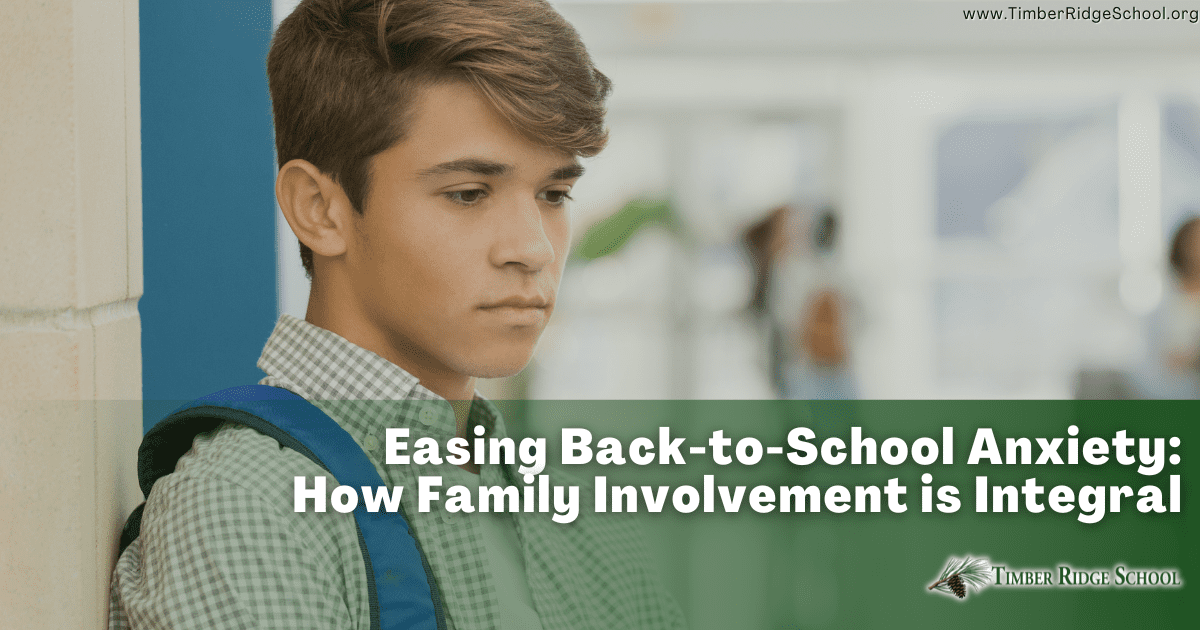Back-to-school season can be stressful for any student. At Timber Ridge School, this season can present a unique kind of stress for students undergoing residential treatment. Returning to an academic routine and a structured life in residential treatment can trigger deep anxiety.
According to recent data from SAMSA, nearly “1 in 5 adolescents ages 12 to 17 reported a major depressive episode in the past year.” This likely stems from the last few years having been marked by COVID-19, an uptick in disasters, and coverage of worldwide violence. All of this has led to increased anxiety, depression, and other mental health conditions rising in our younger generations earlier than ever before.
We at Timber Ridge School believe that the key to easing back-to-school anxiety lies in intensive family engagement. In fact, family-centered residential care is considered an emerging best practice, not a simple “nice-to-have.” We prioritize family involvement as a key component of our treatment success.
So the role of family engagement at Timber Ridge School is huge. Here’s how families can play a pivotal and practical role in managing back-to-school anxiety for students, ensuring their overall success in the treatment program.
Timber Ridge School Equips Families to Support Students
Timber Ridge School integrates families into every step of the process. We offer tools, resources, and opportunities for families to actively engage with their loved one in treatment, especially during back-to-school season when usual anxiety levels may be higher.
“Students whose caregivers are actively involved in their treatment at Timber Ridge School typically exhibit more rapid improvements and achieve better long-term success,” said Lisa Rounds, Director of Diagnostic and Assessment Services. “Caregivers are integral to the effective management of childhood anxiety, as they establish a secure environment where children feel understood, valued, and protected.”
Here are some more specific tips and resources:
- Consistent Routines – We encourage families to help establish routines that mimic the structure their loved one would experience at Timber Ridge School. This includes helping students set goals and encouraging healthy coping habits and daily routines. This all starts at home and must be sustained during breaks from school. You are part of the student’s treatment.
- Frequent Communication – Regular contact between students and their families — through phone calls, letters, or video chats — helps students feel grounded. Knowing that their family is there to support them through challenging moments makes a big difference in managing back-to-school anxiety.
- Family Counseling Sessions – Family counseling, consistent with the Building Bridges resolution, can give families the tools to understand their child’s anxiety and how they can best provide support. Our licensed counselors work with both the student and the family to develop strategies for easing transitions during treatment, including managing emotional triggers and reinforcing positive coping mechanisms.
- Family Engagement Activities – We schedule family-focused activities that provide a safe space for families to bond, celebrate progress, and practice communication skills. These interactions help students feel more connected. This can reduce stress and build confidence as they prepare for the academic year.
Guidelines for Families to Stay Engaged & Ease Anxiety
Back-to-school anxiety can manifest in many ways, from fear of academic failure to worries over social interactions. That’s not even touching the unique set of expectations and stress that the residential treatment component adds.
Anxiety, whether it’s centered on school or more general, is not an uncommon concern for teens and children, unfortunately. According to Johns Hopkins Medicine, “anywhere from 1 in 10 to 1 in 13 people suffer from anxiety, with about 8% of children and teenagers experiencing an anxiety disorder.” Anxiety comprises the most common mental health disorder in the country.
“By modeling healthy coping strategies, encouraging open communication, and cultivating a supportive and empathetic atmosphere, caregivers help equip children and adolescents with the necessary tools to manage anxiety effectively,” Lisa Rounds reinforces for caregivers of students with anxiety, whether they’re at Timber Ridge School or not.
As a parent or loved one, your involvement is key to helping your anxious students succeed in every aspect. Here are just a few ways you can stay engaged as your student returns to school and treatment:
- Acknowledge Their Feelings – Listen to the student’s concerns without judgment. Validate their feelings and reassure them that it’s okay to feel anxious about returning to school. Remind them of the purpose for the program, and the future they can look forward to upon completion.
- Collaborate with Teachers – Stay connected with your school’s teaching staff to get updates on your child’s progress. Learn about the areas where they may need extra support. This partnership ensures that everyone is working together to ease the back-to-school transition and the program’s efficacy.
- Be Present During Milestones – Whether it’s the first day of class or overcoming a particular challenge. Try your best to be there (even virtually) to celebrate milestones. This helps students feel supported and confident.
- Encourage Healthy Coping – Remind your student of the coping strategies they’ve learned. Actively play a part in reminding them of healthy habits that can reduce anxiety and solidify their overall treatment results.
Conclusion
“Back-to-school” season is more than just a return to academics for students wrestling with mental health. It’s about rebuilding confidence and finding stability. Family engagement plays a critical role in this process. The family’s consistent involvement is critical to easing anxiety from transitions like the start of a new school term. It can also help improve treatment outcomes.
Students feel more supported and secure when they know their family is also actively involved in their journey. This emotional connection can significantly reduce feelings of isolation and help them manage the anxiety that often accompanies change.
Families who stay connected, involved, and informed, can provide the support their loved ones need to succeed — in the classroom and beyond.
Learn more about the residential treatment program services at Timber Ridge School.

